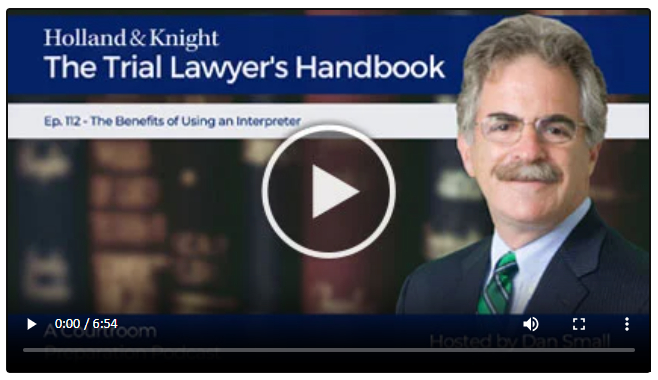- within Strategy topic(s)
In this episode of "The Trial Lawyer's Handbook" podcast series, litigation attorney Dan Small delves into the debate on using interpreters for witnesses in the courtroom. In some instances there is no choice: A witness who cannot understand English requires an interpreter. But when it's a gray area, some lawyers argue that an interpreter diminishes the connection between the witness and the jury. Mr. Small disagrees and offers a humorous anecdote from the corruption case United States v. Wallen, which he prosecuted, to support his pro-interpreter stance. He closes by reminding the listeners that misunderstandings often hurt your case and that interpreters help minimize them for both sides.
Listen to more episodes of The Trial Lawyer's Handbook here.
This podcast episode was adapted from Mr. Small's book Lessons Learned from a Life on Trial: Landmark Cases from a Veteran Litigator and What They Can Teach Trial Lawyers.
Podcast Transcript
Dan Small: Language is so important in any trial: the words, the inflection, how it's said, why it's said, all of that. And so trial lawyers properly debate the pros and cons of using interpreters for witnesses in depositions or in trial. Sometimes it's just absolutely necessary. If the witness has little or no understanding of English, you may have no choice. But what if it's a close call? Some lawyers prefer not to use interpreters if at all possible because it diminishes the connection between the witness and the lawyer and between the witness and the finder of fact.
I disagree, and I learned that lesson, in part, in the Wallen corruption prosecution we've been talking about in prior episodes, from Domenic D'Alessandro, our witness. Domenic was born and raised in Italy. He came to this country at 17, and although he lived here for almost 20 years, he mostly lived, worked and socialized with other Italian immigrants. So although his English was enough that he could usually get by in business, English never became his native tongue. Returning to Italy and living there for several years before our case began made the problem more acute.
Preparing for trial, Domenic resisted any suggestion that we get an interpreter. He was too proud. Sitting in a United States courtroom with an American jury and others watching him made using an interpreter embarrassing. I tried to convince him without success. So we did a mock cross-examination without an interpreter to see how it would go. It didn't. It was a mess. He answered questions he didn't understand, answered questions that hadn't been asked, got confused and, yes, got embarrassed. When it was over, he agreed to an interpreter.
The interpreter we brought in was a lovely lady. Smart and charming; petite and almost schoolmarmish in appearance. I'm telling you, central casting for interpreters. I gave her the indictment and other materials to read so she could familiarize herself with the people and places in the case. She and Domenic spent time with us and became fast friends, which increased his comfort level with the decision.
At trial, she provided two important advantages. First, she helped Domenic understand what was being asked before he answered. Several times, particularly during my direct examination, Domenic went too fast. He answered questions without using the interpreter. Sometimes it worked, but sometimes it was clear that he had misunderstood part of the question. Fortunately, no real harm was done, and during the breaks I kept encouraging him: "Domenic, use the interpreter. It's OK, use the interpreter."
Sometimes when he ventured off on his own, the results were humorous and even endearing. One example: Among the various bribes, Charm Construction bought several cars for members of the Wallen family, including a big Buick Electra for Frank Wallen's mother. In his testimony, I asked Domenic why he bought the car, knowing that the answer was, well, because Frank Wallen had told him to in exchange for more contracts. But Domenic waved off the interpreter and misunderstood the question.
So with descriptive gestures, he replied, "She big woman," — forgive me for the accent — "She big woman," with his arms out wide, "drive little s**t box car," putting his hands close together. The jury burst out laughing. I asked the question again a little more pointedly and got the right answer, so all was well. But it was a good indication of why interpreters are important, particularly for those subtle distinctions that can make or break your case.
Second, particularly on cross-examination, the interpreter gave Domenic time and protection. On cross-examination, defense counsel asked questions aggressively and rapidly, trying to get some momentum going. Domenic's English was neither aggressive nor rapid. He would have been lost. Although the lawyer's outrage was aimed at Domenic, the questions went first to this demure, petite woman. She would politely listen, then turn to Dominic, have a back-and-forth conversation in Italian, then turn back to the lawyer and give a polite, simple answer.
Sometimes the conversation between the interpreter and Domenic was long, but the answer was short. The lawyer would ask a question, the interpreter would turn to Domenic and have a long back and forth, and then turn back to lawyer and say, "No." Defense counsel complained to the judge — clearly, Domenic had said more than that — but the interpreter replied that interpreting the questions properly required some explanation, and that was the end of that. On the key government witness, defense counsel had a hard time building any momentum on cross-examination. The interpreter wouldn't let that happen.
After that experience, I've always tried to encourage the use of interpreters to try to minimize misunderstandings in both directions. Obviously, it depends heavily on the quality of the interpreter, but that's just one more piece to test out and prepare for as you get ready for deposition or trial. Good luck.
The content of this article is intended to provide a general guide to the subject matter. Specialist advice should be sought about your specific circumstances.


